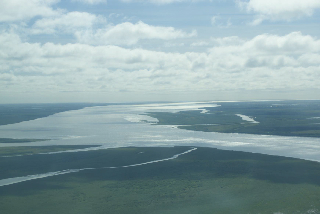 The huge, relatively shallow Yukon River Delta empties into the vast Bering Sea, home to the largest single-species fishery in the world: Alaskan pollock. Giant trawlers scoop up millions of pounds of pollock every year, more than $2 billion worth, to be processed and sold as frozen fish sticks and "krab." It's a healthy, sustainable industry (its proponents say) that provides low-cost protein for millions of people around the world. And, through a government program called Community Development Quotas, the impoverished native villages of Western Alaska actually own a share of the fishery.
The huge, relatively shallow Yukon River Delta empties into the vast Bering Sea, home to the largest single-species fishery in the world: Alaskan pollock. Giant trawlers scoop up millions of pounds of pollock every year, more than $2 billion worth, to be processed and sold as frozen fish sticks and "krab." It's a healthy, sustainable industry (its proponents say) that provides low-cost protein for millions of people around the world. And, through a government program called Community Development Quotas, the impoverished native villages of Western Alaska actually own a share of the fishery.
But there's a catch to the catch.
It's called by-catch, species other than pollock that get caught in the nets of the offshore fishery. Were they just junk fish, it would be no problem. But the pollock by-catch consists of chinook (king) and chum salmon returning to their Yukon River spawning grounds, plump with fat and omega 3 acids, some of the healthiest and best-eating fish on the planet.
Even more important, though, than feeding discriminating diners in Seattle, the Yukon king salmon provide subsistence for villagers on the river's banks. Entire families go out in shallow boats to snag them as they make their way into the river. This is a part of Alaska, it bears repeating, where gas costs $10 a gallon, where the pollock fishery has decimated the salmon runs, where even Gov. Sarah Palin recognizes (albeit reulctantly) the humanitarian crisis of starving villages.
A noisy hearing in Alaska this week pitted the pollock people against the salmon supporters, both sides also making use of the Internet to tell their stories.
The temporary solution, an unsatisfactory compromise, to "limit" the by-catch, makes little sense, since the salmon (worth $5 a pound to the natives) are considered worthless by pollock trawlers; the lifeless carcasses are simply dumped back in the sea. In theory, limiting the by-catch would require trawlers to stop fishing when they reach a maximum number of salmon; in practice, they'll probably continue.
"The pollock fishery got what they wanted," says Jon Rowley, the Seattle food guru who weighed in on behalf of the salmon.
It's a saga straight out of Spotted Owl territory, a historic conflict of interest between farmers and cowmen (who ended up, in Oklahoma!, at least, being friends), with no guarantee of a Judge Boldt decision in favor of either fish. But it's not just about the fish, it's about the people who live by the fish, and there's no easy answer.
Leave a comment